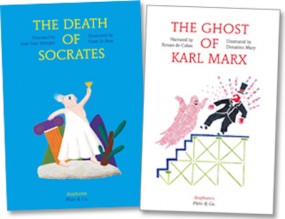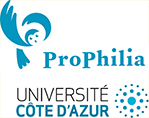Un article (en anglais) sur le lancement de Marx et Socrate aux États-Unis !
Un article (en anglais) sur le lancement de Marx et Socrate aux États-Unis !
En amont du lancement de Marx et Socrate aux États-Unis par l'éditeur Diaphanes, en partenariat avec University of Chicago Press, Publisher's Weekly s'est intéressé à la collection !
University of Chicago Press, in an existing distribution partnership with German publisher Diaphanes, will bring a French series of philosophical picture books to the U.S. in September. The series, Plato & Co., known abroad as Les petits Platons, launched in France in 2010 by Paris-based author and editor Jean Paul Mongin. Because of its relationship to international publishers, the series is available in 40 countries and in 15 languages, where early reception has been quite positive, with plenty of press attention and enthusiastic feedback from teachers and children alike.
Where existing American philosophy books for children typically focus on surveys of ideas or broad historical overviews, the Plato & Co. books take a more “storied” approach. The first two volumes releasing this fall – The Death of Socrates by Mongin, translated by Anna Street, illustrated by Yann Le Bras, and The Ghost of Karl Marx by Ronan de Calan, translated by Street, illustrated by Donatien Mary – take isolated events in the lives of the philosophers to illustrate their theories, aiming to teach a philosophical theory through the experience of reading a traditional picture book.
For the series editor (and sometimes author-contributor) Mongin, this approach, and finding “the appropriate point of view in order to tell a story that fully expresses the theory,” can be a challenge. Mongin’s goal, he said, is to find the “fictional development of the theory. Kant has a good word for it: surmise. The moment when reason offers imagination the power to express the concept.”
Mongin came to create the series after a couple of turns. He studied, and fell in love with, philosophy as an adolescent, and went on to study it at the Sorbonne. For a time, he took a job in marketing to support his family, but left to pursue his idea for Les petits Platons, and started writing the first stories based on classical philosophers he knew well: Socrates, Descartes, and Kant.
Current series readers abroad, Mongin said, run the gamut: “children from nine or 10 can enjoy them, but teenagers may find them interesting as well, and many adults are reading them, too.” Mongin estimated that adults comprise somewhere between 40-50% of the series’ current French readers. As in the U.S., the study of philosophy in France typically does not begin until the university level. Mongin sees this as “a real problem, because philosophy could help children build themselves, to learn their own language, to hear others and to define what they feel. Philosophy is seen as difficult, theoretical, academic, but for me, nothing is more concrete than philosophy. Philosophy is just life!”
The collection will continue with two titles releasing next spring: Mister Descartes and His Evil Genius, also written by Mongin and translated by Street, illustrated by François Schwoebel, and Hannah Arendt’s Little Theater by Marion Muller-Colard, translated by Street, illustrated by Clémence Pollet. Mongin’s aim for the books is to share his own love of philosophy in the hopes that it inspires younger readers to dive in themselves. “I hope,” he said, “that I will live long enough to read a young philosopher declare: ‘As a child, I read Les petits platons, and so I tried to continue the story...’ ”


